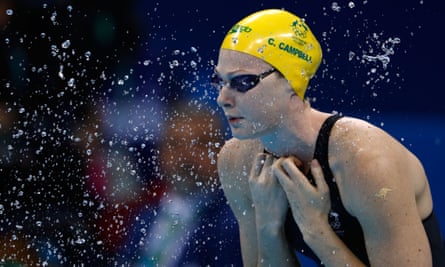It wasn’t supposed to be like this. After Australia’s relatively poor showing at the 2012 London Olympics – relative to the three Olympic Games that preceded it, that is – Rio 2016 was going to see a wiser, rejuvenated Australian team return to their rightful place on the Olympic medal table. Where exactly? Well, somewhere near the top. Or at least close enough to see the top without squinting or having to tap eight other nations on the shoulder and ask them to kindly hunker down as they’re blocking the view.
And it’s not as if it was just the media pumping up the Australian team’s tyres before they headed off to Brazil in their mint-green, pin-striped blazers and cumulous cloud-white shorts and skirts, designed, one assumes, to cope with the changeable climate aboard Rio-bound planes. No, chief among the big talkers was the Australian Olympic Committee whose December 2015 study – a “benchmark” study, no less – predicted 13 gold medals. Six months later the Australian chef de mission, Kitty Chiller, raised that to a possible 16 as she, and the Australian Sports Commission, targeted a top five finish for the mob in green and gold.
Well, as we’ve seen, it hasn’t quite worked out that way (so perhaps it’s time the AOC stopped making such predictions which, besides being inaccurate, could be seen to be millstones hung around the necks of Australia’s Olympians). No, in the coming days, when Brazilians are busy stacking chairs and taking down bunting, and the Tongan flag-bearer is busier still weighing up all those offers of an oil change from athletes and commentators whose days have suddenly become freed up, the 422-members of the Australian team will begin returning home with half of those predicted gold medals in their collective hand luggage.
How does one begin to gloss over the wonderful performances of, among others, Kyle Chalmers, Kim Brennan, Chloe Esposito and the women’s rugby sevens team, and sum up this apparently sorry state of affairs? Well, as a News Limited article claimed, “a sense of despondency has engulfed Australia”. You’d think the revelations from Nauru might have already achieved that, but then sporting results have always been one of Australia’s preferred methods of measuring its self-esteem and making its mark on the world.
No doubt, in the wake of Australia’s worst showing at an Olympics since, well, London, there will be many autopsies to come, as well as autopsies of the autopsies. After all, there has got to be a reason for such disappointing results, if not someone or something to blame. When shareholders are expecting a return on their investment, it can’t simply be that Australia’s athletes were beaten by better athletes on the day.
While many of Australia’s defeated Olympians got into the spirit of things by issuing apologies, and, like swimmer Cate Campbell, even admitting, with heartbreaking, David Brent-like self-consciousness and awkwardness, that they choked under pressure, it won’t be enough to placate the critics. Not just the average couch-bound Australian with one hand down the neck of a bag of crisps as they bemoan the failure of their Olympians, but other critics. The ones in suits.
Following London, the Australian Sports Commission, under the leadership of the Melbourne investment banker, John Wylie, instituted the Winning Edge funding model. The model, given an enthusiastic thumbs up by AOC president John Coates, dispersed some $250m of government funds to improve, at the expense of many smaller sports, the chances of the well-regarded teams within the team; those of swimming, cycling, rowing and sailing, sports where there are plenty of medals on offer.
At the same time, a redistribution of funds saw $25m stripped from the ASC bureaucracy and its high-performance arm, the Australian Institute of Sport. As a result, swimming, cycling, rowing and sailing became solely accountable for how they spent their handouts with little oversight or input from the various AIS-based experts.
As such, in the four years prior to Rio, Swimming Australia received $37.9m, rowing $32.4m, cycling $34.1m and sailing $29m. But as we’ve just seen, the swimmers in Rio won just three gold medals (albeit an increase compared to one in London), the rowers and sailors, one each, and the cyclists, none. Money well spent?

While Winning Edge is intended to be a 10-year plan, John Coates – who has reportedly collected $7.05 million in consulting fees and allowances since 2000 – recently told the Australian Financial Review that he has lost faith in the program. In a move that brings to mind Pontius Pilate washing his hands, Coates said that he would step down from a review of the model after Rio. “We think they clearly need to look at the [funding] model and the system behind the model … There has got to be a greater spread of funding. There are sports out there that are doing it tough now.”
In another comment that foretells the finger pointing we should expect to see in the coming months, Coates queried the number of sporting bodies within Australia being headed by people with little expertise in that sport, such as Swimming Australia, the president of which is former sailor John Bertrand, and Cycling Australia, headed by former cricket administrator Malcolm Speed. Curiously, three years ago Coates was blowing air into Bertrand’s spinnaker saying he had “impeccable connections” and that the AOC was “very supportive” of his appointment.
While he made no reference to the salaries of many of Australia’s sporting administrators, Coates added that more funding for sports was needed, and he supported Wylie’s idea that Australia should copy the United Kingdom’s use of a national lottery to fund sport, “especially as it looks like the government will not step up now [with more funding].”
Furthermore, it’s been suggested that Winning Edge should stop financially rewarding sports for medals won at world championships. Australia’s cyclists and swimmers did particularly well at their most recent world championships, which led to many a bold Rio prediction. Cycling Australia publicly targeted five track medals at Rio but in the six days at the velodrome – days utterly dominated by Great Britain’s cyclists, every one of whom left Rio with a medal – Australia collected just two, a silver (to the men’s pursuit team) and bronze (to Anna Meares).
Should cycling, for one, be prepared to take a hit at world championships in order to focus on peaking for the Olympics? Maybe, said Cycling Australia CEO Nick Green. “Now that’s going to take some understanding from funders, and also from athletes because there’s an expectation now in Australia to perform every time we line up at a world championship,” he said. “We need to master an August peak and we haven’t nailed that yet.”
Along with all this talk of funding, numerous other theories have been put forward in an effort to account for Australia’s performance in Rio. For instance, it’s been said that Australia’s swimmers – upon whose broad shoulders the country’s gold medal count is usually 40-50% dependent – peak too early, what with the Olympic trials being held in April (compared with the US trials which are held a month out from the Olympics). Swimming great Ian Thorpe wondered, too, if Australia’s swimmers were victims of expectation in a way the USA’s swimmers are not. In short, it wasn’t overconfidence that sunk them, but pressure.
Then there’s the theory of contagions – no, not of the Zika virus kind. Consider the idea that team togetherness drives success, that there’s a knock-on effect when athletes see their compatriots doing well. If there’s something to that perhaps, simplistically, there’s also something to the reverse, that seeing teammates fail – and seeing the media reaction that ensues – causes a snowballing of fear and anxiety which is hardly conducive to personal best performances.
Is there something to this? Did seeing some of our highly fancied swimmers fail to win medals and/or come close to their PBs cause a collective dropping of bundles, a mass clutching of pearls? In short, can one blame the Boomers’ shocking capitulation against Serbia on Cate Campbell’s or Cameron McEvoy’s disappointing form in the pool?
Of course not. For one, it’s solipsism, and arrogance, on a national scale to think that Australia’s so-called failure in Rio has everything to do with Australian athletes and nothing to do with the excellence of the opposition; as if the competitors from the rest of the world did a Steven Bradbury and merely stayed on their feet as Australia’s best fell down with the line wide open.

It’s arrogance, too, to think that Australia’s much touted ability to “punch above its weight” is – or perhaps “was” is now more accurate – something innate, or a gift reserved solely for those born or bred in this wide brown land that’s girt by sea. While Australia’s great sporting endeavours surely have something to do with the nation’s outdoor lifestyle, in more recent times, times that have encompassed the Olympics of Sydney, Athens and Beijing, it’s the country’s willingness to dig into the public purse that has underpinned Australia’s high standing on the medal table (fourth in both Sydney and Athens).
Well, the jig appears to be up. Other countries are on to it, Great Britain and now Japan among them, just as they’re busy hiring Australian coaches. And the effect is not just being seen in Olympic sports. Australia’s cricket, rugby union and rugby league teams are not as dominant as they were during the sun-kissed years around the turn of the millennium.
So often the butt of sporting jokes, Great Britain threw dough at its sporting programs in the lead up to London 2012 and has reaped the rewards. It was the same story for Australia heading into Sydney 2000 where Australia won 58 medals, 16 of them gold. And like Australia’s performance at Athens 2004 (17 golds), Great Britain has maintained the rage after their home Games. To think, 20 years ago in Atlanta, Great Britain won a total of 15 medals, just one of them gold.
Forgetting all that for a moment, it could be argued that despite the talk of despondency, Australia’s has actually done quite well in Rio for a nation of its population and wealth. Yes, no doubt, a number of performers and teams failed to live up to their potential, but look at the countries above Australia on the table, all countries with bigger populations and bigger GDPs. Take out the Games of London, Athens and Beijing (as well as the Melbourne Games of 1956) Australia’s performance in Rio compares well to any of the others since the modern Olympics began in 1896.
Perhaps Australia needs to consider that its period of well-planned, well-funded sporting over-achievement is over. The rest of the world has caught on and caught up, and unless the nation is willing to engage in a funding arms race merely for the cachet of sitting in about fifth place on an Olympic medal table, Australians best get used to it. Better still, it wouldn’t hurt to focus on what their athletes have achieved, and not what they haven’t.

